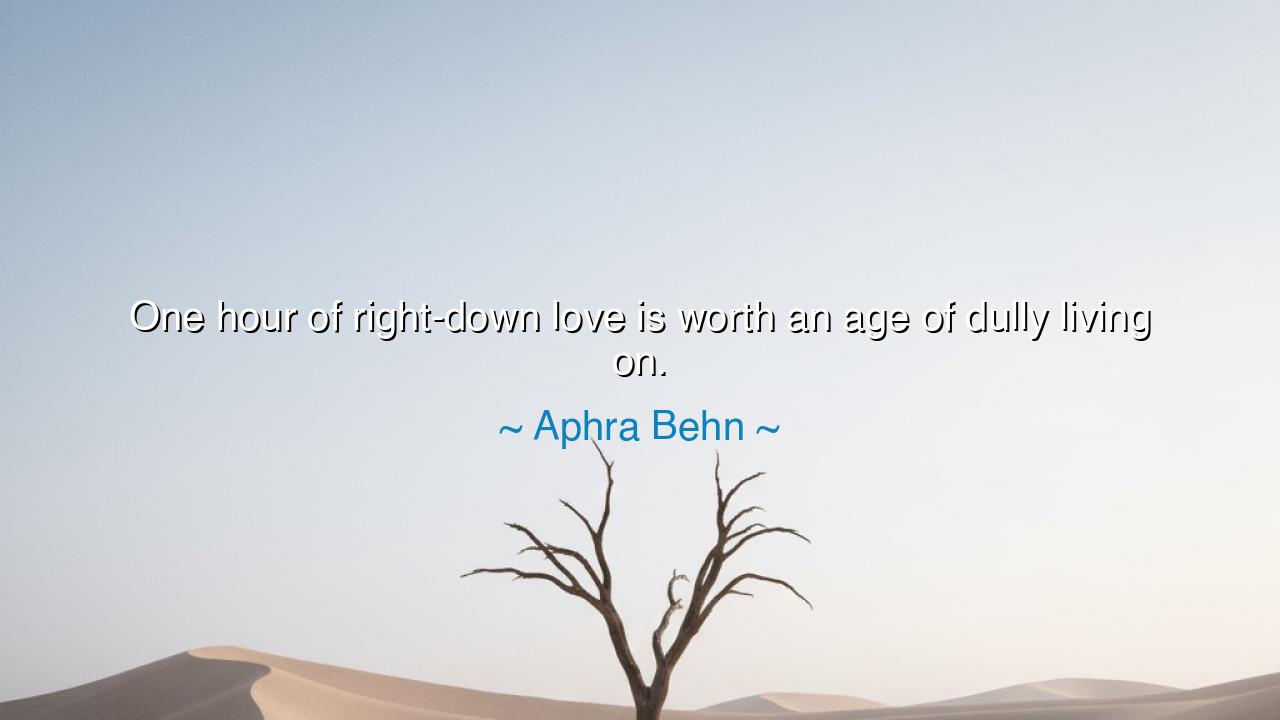
One hour of right-down love is worth an age of dully living on.






“One hour of right-down love is worth an age of dully living on.” So spoke Aphra Behn, the daring voice of the seventeenth century—poet, playwright, and the first woman of England to live by her pen. Her words strike not softly but like a bell rung at midnight, echoing through the chambers of time. In that one line, she gives testimony to the divine truth that passion, when pure and whole, grants more life than a thousand safe and tepid years. For Behn knew that to truly live, one must not merely exist, but burn—if only for a brief and glorious moment.
When she speaks of right-down love, she does not mean the polite affection that fills quiet parlors, nor the half-hearted tenderness that fears its own fire. She means love that seizes the soul and demands truth—love that strips away pretense, that dares the heart to beat without armor. Such love is raw, unmeasured, and dangerous to the timid. Yet it is precisely in that danger that it becomes sacred. The ancients understood this well. They told of Prometheus, who loved humanity enough to steal fire from the gods. For that single act of divine rebellion, he suffered eternally—but his one moment of defiant compassion shone brighter than the endless calm of Olympus.
Aphra Behn’s words were forged in an age when women were expected to obey, to be still, to let life happen to them rather than through them. Yet she herself lived as a storm. Spy, writer, lover, survivor—she defied the dullness that society offered her and chose instead the hour of passion, the brief but burning joy of authenticity. In her art and her heart, she declared that a life without love—whether romantic, creative, or spiritual—is a life that has never truly begun. Thus her quote is not only about romance, but about vitality itself. It is a hymn to the spirit that refuses to wither in routine.
Consider the story of Emily Dickinson, who lived in solitude and yet loved so fiercely that her poems pulse with it still. Though she rarely left her home, she wrote of passion as though her pen were aflame. For her, as for Behn, love was not bound by touch or time—it was the soul’s recognition of its own vastness. One letter, one hour, one honest heartbeat could hold eternity within it. She too understood that to feel deeply, even once, is to have lived more than those who float upon the surface of existence.
The dull life Behn warns against is not a punishment from fate—it is a choice. It is the slow suffocation of comfort without wonder, repetition without meaning, safety without joy. To drift through life unawakened is to be like the unlit candle: possessing all the potential for light, yet never daring to burn. But love, in its truest form, is the flame that consumes dullness. It awakens the senses, sharpens the mind, and makes the spirit vast. It may not last forever—but it does not need to. One hour of it can give the heart enough memory to illuminate a lifetime.
This truth has echoed through every age. When Helen of Troy left her city for love, the world called it ruin—but poets called it immortality. When Frida Kahlo painted her pain and passion, she turned her suffering into eternal color. These are the souls who chose the hour of fire over the centuries of gray. They knew that love, in all its forms—romantic, creative, divine—is not safe, but sacred. And to taste it, even briefly, is to stand at the threshold of the infinite.
So let this be your teaching: Do not waste your days in the dull hum of fear or duty alone. Seek moments that awaken you—moments of right-down love, where you are wholly yourself, unmasked and alive. Love boldly, create passionately, speak truth even when it trembles in your throat. The measure of a life is not in its length, but in its depth. For as Aphra Behn reminds us, one hour of living fully, of loving completely, of daring to feel beyond reason, is worth more than an eternity of safety.
Practical teaching: Each day, ask yourself, Have I felt truly alive today? Reach for what moves you—whether it be a person, a dream, or a calling. Do not fear the briefness of joy; fear instead the long emptiness of never having known it. Let your heart burn bright, even for an hour—for that hour will outshine a century of dully living on.






AAdministratorAdministrator
Welcome, honored guests. Please leave a comment, we will respond soon